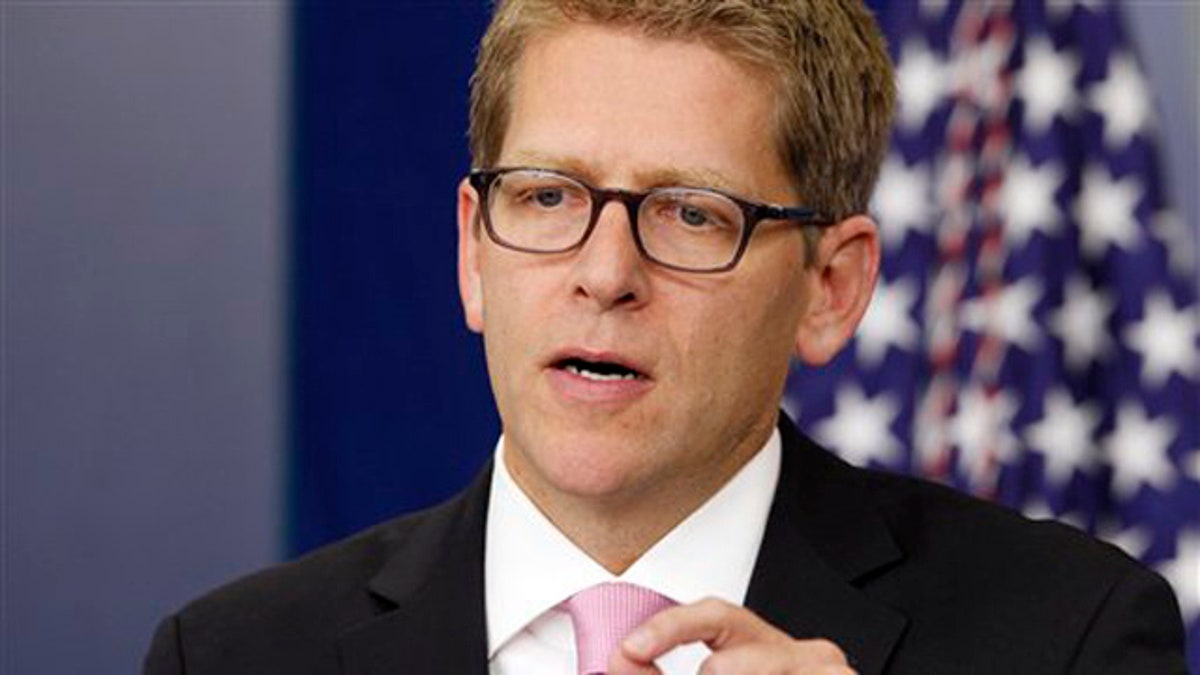
White House Press Secretary Jay Carney briefs reporters at the White House Sept. 6. (AP)
A day before President Obama delivers his new jobs plan, the White House ramped up pressure on Congress to act on the president's proposals -- preemptively pinning the blame on lawmakers in the event those proposals die.
But despite widespread speculation about the contents of the president's plan, White House Press Secretary Jay Carney repeatedly declined to elaborate on what it might contain. He said only that the proposals would be "bipartisan" and that Congress should pass them.
"He will call on Congress to take up those proposals because they are sensible, they are bipartisan and they are paid for," Carney said, claiming the American people are tired of "excuses" and the only reason for Congress not to act will be if "politics gets in the way."
"The American people expect Washington to take sensible measures to grow the economy and create jobs and to pay for it. The president will put forward a proposal to do that. He'll do it in front of Congress because he is calling on Congress to act," he added.
Republican lawmakers voiced skepticism in the run-up to the address.
Several GOP lawmakers announced they will not attend. Others groused that the administration is not doing enough to tackle excessive regulation. Though Carney cited the president's "fine working relationship" with House Speaker John Boehner and prior meetings the two have had, Boehner's office complained that they would not have a chance to discuss a jobs plan with the president before the address.
"It's hard to take seriously the White House suggestion that his plan will include bipartisan proposals when Republicans are not allowed any input," Boehner spokesman Brendan Buck said.
The mood underscores what countless lawmakers and analysts have been saying for days -- the president faces enormous pressure to unveil something big, something new and something bipartisan, or watch Thursday's address fall into the just-another-speech annals.
At a minimum, Obama is expected to propose a package of federal spending and tax cuts worth at least $300 billion.
Among some of the items that would quickly add up are a $110 billion payroll tax cut extension as well as $60 billion for extending unemployment benefits for another year; a highway bill worth $90 billion that the president proposed last month to extend but which has not gone anywhere; a $40 billion job training program; and a targeted payroll tax cut for employers to encourage new hiring worth about $30 billion.
Obama has also called for public works projects, such as school construction. Advocates of that plan have called for spending of $50 billion, but the White House proposal is expected to be smaller.
That would easily surpass a $300 billion price tag, and the proposals may be closer to $400 billion to $500 billion.
Obama faces the dual challenge of proposing something big enough to jump-start the economy but not so big that it turns off the deficit hawks in both parties.
Carney, mindful of deficit concerns, insisted Wednesday that the proposals will be paid for. "We're not going to bust the debt ceiling," he said.
Though the president may look to offset the new spending by closing tax loopholes, Sen. Jeff Sessions, R-Ala., warned Wednesday that Republicans will oppose the package unless it's offset by spending cuts.
The White House also shot down a rumor Wednesday that the administration was considering a moratorium on regulations, drawing a rebuke from House Republican Leader Eric Cantor's office. "Such excessive regulations stifle economic growth," his office said.
Senate Republican Leader Mitch McConnell likewise said the administration is "throwing a big wet blanket on job creation." Rep. Allen West, R-Fla., urged the president to reduce regulatory burdens, calling his current policies "anti-growth."
On the other side of the equation, a liberal group called Social Security Works, warned Obama that any payroll tax cut for employers will do nothing to stimulate new hiring by companies "suffering from weak demand rather than weak profits."
"This tax cut would be bad enough if it were not also undermining Social Security," said Social Security Works Co-Director Nancy Altman. "America's richest companies, many of which pay little in taxes, do not need another tax break. Many companies that will benefit have a long record of shipping thousands of jobs overseas. There is not even a requirement that a company has to create a single job to get this tax break."
Obama will lay out his plans during an early prime-time speech at 7 p.m. ET, scheduled to precede the NFL's regular season opener. Republicans have not scheduled a rebuttal to follow the speech.
The proposal comes as the employment report for August released on Friday showed no net job growth. The unemployment rate remained at 9.1 percent as fewer people looking for work applied for jobless benefits.
The Economic Policy Institute, in a new report, said the ratio of jobless Americans to job openings is about 4-to-1. It's been at or above that ratio for two years and seven months.
The White House has cautioned that Thursday's plan will not be a cure-all.
"There is no silver bullet. There is no measure that can be taken by Washington that will solve the problem. This is an all-hands-on-deck proposition," Carney said.




